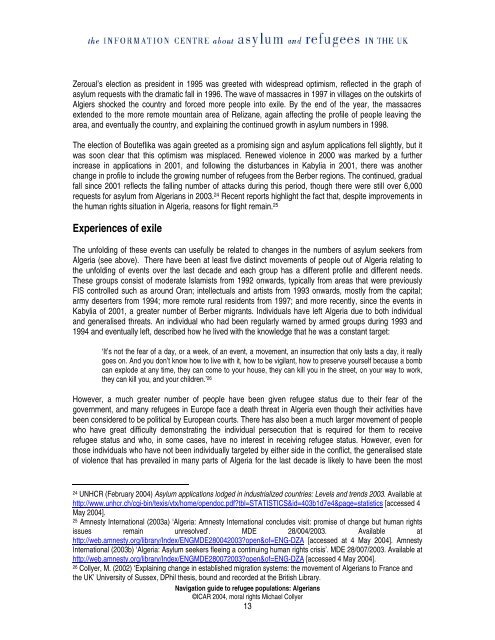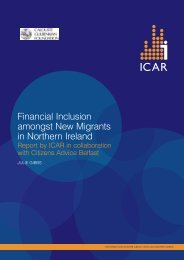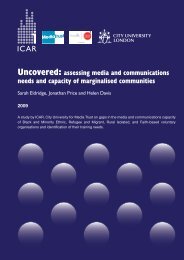Navigation guide Refugee populations in the UK: Algerians - ICAR
Navigation guide Refugee populations in the UK: Algerians - ICAR
Navigation guide Refugee populations in the UK: Algerians - ICAR
You also want an ePaper? Increase the reach of your titles
YUMPU automatically turns print PDFs into web optimized ePapers that Google loves.
Zeroual’s election as president <strong>in</strong> 1995 was greeted with widespread optimism, reflected <strong>in</strong> <strong>the</strong> graph of<br />
asylum requests with <strong>the</strong> dramatic fall <strong>in</strong> 1996. The wave of massacres <strong>in</strong> 1997 <strong>in</strong> villages on <strong>the</strong> outskirts of<br />
Algiers shocked <strong>the</strong> country and forced more people <strong>in</strong>to exile. By <strong>the</strong> end of <strong>the</strong> year, <strong>the</strong> massacres<br />
extended to <strong>the</strong> more remote mounta<strong>in</strong> area of Relizane, aga<strong>in</strong> affect<strong>in</strong>g <strong>the</strong> profile of people leav<strong>in</strong>g <strong>the</strong><br />
area, and eventually <strong>the</strong> country, and expla<strong>in</strong><strong>in</strong>g <strong>the</strong> cont<strong>in</strong>ued growth <strong>in</strong> asylum numbers <strong>in</strong> 1998.<br />
The election of Bouteflika was aga<strong>in</strong> greeted as a promis<strong>in</strong>g sign and asylum applications fell slightly, but it<br />
was soon clear that this optimism was misplaced. Renewed violence <strong>in</strong> 2000 was marked by a fur<strong>the</strong>r<br />
<strong>in</strong>crease <strong>in</strong> applications <strong>in</strong> 2001, and follow<strong>in</strong>g <strong>the</strong> disturbances <strong>in</strong> Kabylia <strong>in</strong> 2001, <strong>the</strong>re was ano<strong>the</strong>r<br />
change <strong>in</strong> profile to <strong>in</strong>clude <strong>the</strong> grow<strong>in</strong>g number of refugees from <strong>the</strong> Berber regions. The cont<strong>in</strong>ued, gradual<br />
fall s<strong>in</strong>ce 2001 reflects <strong>the</strong> fall<strong>in</strong>g number of attacks dur<strong>in</strong>g this period, though <strong>the</strong>re were still over 6,000<br />
requests for asylum from <strong>Algerians</strong> <strong>in</strong> 2003. 24 Recent reports highlight <strong>the</strong> fact that, despite improvements <strong>in</strong><br />
<strong>the</strong> human rights situation <strong>in</strong> Algeria, reasons for flight rema<strong>in</strong>. 25<br />
Experiences of exile<br />
The unfold<strong>in</strong>g of <strong>the</strong>se events can usefully be related to changes <strong>in</strong> <strong>the</strong> numbers of asylum seekers from<br />
Algeria (see above). There have been at least five dist<strong>in</strong>ct movements of people out of Algeria relat<strong>in</strong>g to<br />
<strong>the</strong> unfold<strong>in</strong>g of events over <strong>the</strong> last decade and each group has a different profile and different needs.<br />
These groups consist of moderate Islamists from 1992 onwards, typically from areas that were previously<br />
FIS controlled such as around Oran; <strong>in</strong>tellectuals and artists from 1993 onwards, mostly from <strong>the</strong> capital;<br />
army deserters from 1994; more remote rural residents from 1997; and more recently, s<strong>in</strong>ce <strong>the</strong> events <strong>in</strong><br />
Kabylia of 2001, a greater number of Berber migrants. Individuals have left Algeria due to both <strong>in</strong>dividual<br />
and generalised threats. An <strong>in</strong>dividual who had been regularly warned by armed groups dur<strong>in</strong>g 1993 and<br />
1994 and eventually left, described how he lived with <strong>the</strong> knowledge that he was a constant target:<br />
‘It’s not <strong>the</strong> fear of a day, or a week, of an event, a movement, an <strong>in</strong>surrection that only lasts a day, it really<br />
goes on. And you don’t know how to live with it, how to be vigilant, how to preserve yourself because a bomb<br />
can explode at any time, <strong>the</strong>y can come to your house, <strong>the</strong>y can kill you <strong>in</strong> <strong>the</strong> street, on your way to work,<br />
<strong>the</strong>y can kill you, and your children.’ 26<br />
However, a much greater number of people have been given refugee status due to <strong>the</strong>ir fear of <strong>the</strong><br />
government, and many refugees <strong>in</strong> Europe face a death threat <strong>in</strong> Algeria even though <strong>the</strong>ir activities have<br />
been considered to be political by European courts. There has also been a much larger movement of people<br />
who have great difficulty demonstrat<strong>in</strong>g <strong>the</strong> <strong>in</strong>dividual persecution that is required for <strong>the</strong>m to receive<br />
refugee status and who, <strong>in</strong> some cases, have no <strong>in</strong>terest <strong>in</strong> receiv<strong>in</strong>g refugee status. However, even for<br />
those <strong>in</strong>dividuals who have not been <strong>in</strong>dividually targeted by ei<strong>the</strong>r side <strong>in</strong> <strong>the</strong> conflict, <strong>the</strong> generalised state<br />
of violence that has prevailed <strong>in</strong> many parts of Algeria for <strong>the</strong> last decade is likely to have been <strong>the</strong> most<br />
24 UNHCR (February 2004) Asylum applications lodged <strong>in</strong> <strong>in</strong>dustrialized countries: Levels and trends 2003. Available at<br />
http://www.unhcr.ch/cgi-b<strong>in</strong>/texis/vtx/home/opendoc.pdftbl=STATISTICS&id=403b1d7e4&page=statistics [accessed 4<br />
May 2004].<br />
25 Amnesty International (2003a) ‘Algeria: Amnesty International concludes visit: promise of change but human rights<br />
issues rema<strong>in</strong> unresolved’. MDE 28/004/2003. Available at<br />
http://web.amnesty.org/library/Index/ENGMDE280042003open&of=ENG-DZA [accessed at 4 May 2004]. Amnesty<br />
International (2003b) ‘Algeria: Asylum seekers flee<strong>in</strong>g a cont<strong>in</strong>u<strong>in</strong>g human rights crisis’. MDE 28/007/2003. Available at<br />
http://web.amnesty.org/library/Index/ENGMDE280072003open&of=ENG-DZA [accessed 4 May 2004].<br />
26 Collyer, M. (2002) ‘Expla<strong>in</strong><strong>in</strong>g change <strong>in</strong> established migration systems: <strong>the</strong> movement of <strong>Algerians</strong> to France and<br />
<strong>the</strong> <strong>UK</strong>’ University of Sussex, DPhil <strong>the</strong>sis, bound and recorded at <strong>the</strong> British Library.<br />
<strong>Navigation</strong> <strong>guide</strong> to refugee <strong>populations</strong>: <strong>Algerians</strong><br />
©<strong>ICAR</strong> 2004, moral rights Michael Collyer<br />
13

















